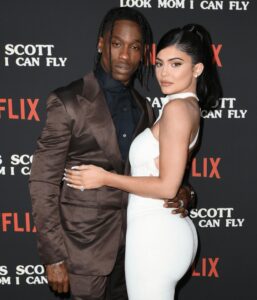CELEBRITY
Kylie Jenner and Timothée Chalamet were all loved up during a rare public outing at the Crypto.com Arena in Los Angeles on Tuesday night, as reported by Daily Mail…, Full Details Here ⤵️⤵️⤵️

Kylie Jenner and Timothée Chalamet were all loved up during a rare public outing at the Crypto.com Arena in Los Angeles on Tuesday night, as reported by Daily Mail.
The backlash surrounding Timothée Chalamet and Kylie Jenner may have less to do with their wealth and more to do with deeper racial and cultural dynamics tied to “blackness” and perceptions of racial purity, particularly within certain segments of white society. This is an important lens through which to view the situation, especially in a society where racialized norms and stereotypes still heavily influence relationships and public perceptions.
Racial Dynamics and the Stigma of “Blackness” in White Relationships
The idea that Kylie Jenner’s relationship with Travis Scott (a Black man) and her biracial children could somehow “taint” her or make her less desirable within certain white circles is rooted in long-standing racial stigmas about miscegenation (the mixing of races) and white racial purity. These views are tied to historical, social, and cultural prejudices that continue to shape attitudes about interracial relationships today.
1. Historical Legacy of Racial Purity and Miscegenation
In the United States, the concept of racial purity has deep roots in the history of slavery, segregation, and white supremacy. For centuries, white supremacy dictated that Black people were inherently inferior to white people, and any mixing between the races was seen as a threat to white dominance.
This view was institutionalized through laws and social practices that criminalized interracial relationships and marriages—laws that were not fully overturned until the mid-20th century (e.g., Loving v. Virginia in 1967, which struck down anti-miscegenation laws).
The cultural stigma around white women being involved with Black men goes beyond just social ostracism; it’s also tied to the perception of blackness as a threat to the social order. In many ways, blackness has historically been viewed as something “lower” or “other” in the racial hierarchy of the U.S. So when a white woman has children with a Black man, there is often an implicit assumption that she is no longer fully “white” in a pure racial sense, and the children are viewed as tainted or less desirable in the eyes of certain conservative, white, and sometimes racist factions of society.
This mindset has been perpetuated for generations and remains latent in some corners of society today.
2. Kylie Jenner’s Position as a White Female with Biracial Children
Kylie’s situation is particularly interesting because of her high-profile public persona and family dynamics. Although Kylie Jenner is white-passing (i.e., she benefits from privilege in many contexts because of her appearance), she is also the mother of biracial children. This places her in a very complicated position within the racial discourse.
Kylie’s Relationship with Travis Scott: When Kylie entered a relationship with Travis Scott, a successful Black rapper, she became a part of an interracial family in the public eye. Despite her own privileged position, being seen as the mother of biracial children ties her to a legacy of Blackness in ways that some people, particularly in more conservative or racially sensitive circles, find uncomfortable.
The Perception of “Blackness” and White Females: There is a certain racialized stigma that exists,
particularly among some white groups, where a white woman’s association with Blackness (whether through relationships or children) becomes a perceived threat to the social order or racial purity. The idea is rooted in an old myth: that white women being involved with Black men somehow marks a loss of racial status for the woman and her offspring. This creates a backlash from people who view the mixing of races as undesirable or dangerous.
3. The Backlash Against Timothée Chalamet and Kylie Jenner’s Relationship
Timothée Chalamet’s fans may be reacting to this dynamic in several ways, some of which likely have to do with the stigma against biracial children and the complex racial politics that come with it:
White Male, Black Female Stigma: There’s a very real stigma among some white males (and broader white society) about white women who have biracial children, particularly if their biracial children have a Black father. This stems from the longstanding belief that blackness can somehow taint or lower the status of white people—especially white women—by association. There is often a sense that a white man dating a woman with biracial children is “compromising” his racial purity or social standing by engaging with someone tied to Blackness, which challenges long-standing white supremacist notions of racial superiority and segregation.
Timothée’s Role in This Narrative: Chalamet, who is perceived by many as intellectual, artistic, and a bit of a cultural “rebel,” is often seen as someone who has navigated Hollywood’s fame with integrity and a sense of authenticity. To some, his relationship with Kylie could feel like a betrayal of the image they’ve built of him—a kind of “cultural betrayal.” By pairing up with someone connected to the Kardashian-Jenner family—who is tied to the world of commercialized, celebrity-driven culture—it might feel like he’s engaging in something that contradicts his more “highbrow” or “independent” public persona.
Racial Hierarchies: The tension between these two celebrities also comes into play when examining how white supremacy and racial hierarchy continue to structure our understanding of relationships. For some fans of Timothée, dating Kylie Jenner—who is the mother of biracial children and has ties to Blackness through her relationship with Travis Scott—could be viewed as “lowering” his status within this racialized framework. For them, it may feel as though Timothée’s choice reflects a white male privilege being placed in a relationship that has an association with blackness—something that, in some people’s eyes, undermines his perceived “whiteness”.
4. Social Media and Online Reactions
In the age of social media, racist sentiment often surfaces in highly visible ways, particularly when relationships between white celebrities and those with connections to Blackness or biracial children are involved. Online discussions can quickly escalate into heated debates about race, purity, and “authenticity.” Given that both Kylie and Timothée are public figures with massive followings, their relationship becomes an avenue for wider social debates around racial purity, white identity, and the commodification of Blackness.
Conclusion: Is the Backlash About Blackness, or Just Wealth?
While wealth and privilege are often part of the conversation around celebrity relationships, it’s clear that the real backlash in this situation is likely rooted in race—specifically, how Kylie Jenner’s connection to blackness (through her biracial children) is perceived by some to challenge or taint her identity in ways that are uncomfortable for certain segments of white society. There is a deeply ingrained social stigma about white women being involved with Black men, and this cultural prejudice continues to affect how interracial families are viewed, even in the context of high-profile celebrity relationships.
This dynamic speaks to the racialized tensions that still exist in society—tensions that continue to influence how people view and react to celebrity relationships, even when they are not directly involved in the lives of the individuals concerned.





















